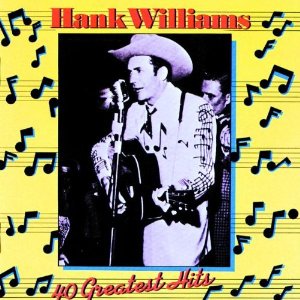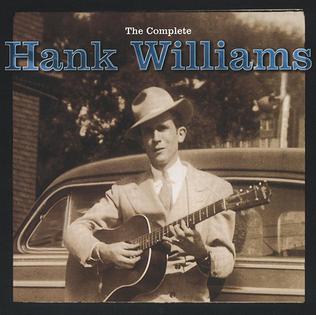Related Research Articles

Hiram "Hank" Williams was an American singer, songwriter, and musician. Regarded as one of the most significant and influential American singers and songwriters of the 20th century, he recorded 55 singles that reached the top 10 of the Billboard Country & Western Best Sellers chart, including 12 that reached No. 1.

"Your Cheatin' Heart" is a song written and recorded by country music singer-songwriter Hank Williams in 1952. It is regarded as one of country's most important standards. Williams was inspired to write the song while driving with his fiancée from Nashville, Tennessee, to Shreveport, Louisiana. After describing his first wife Audrey Sheppard as a "cheatin' heart", in minutes he dictated the lyrics to Billie Jean Jones. Produced by Fred Rose, Williams recorded the song at his last session at Castle Studio in Nashville, Tennessee, on September 23.

Hank Williams The Roy Orbison Way is the fourteenth album recorded by Roy Orbison, and the eighth for MGM Records, released in August 1970. It is a tribute album to the songs of Country Music Hall of Fame honky tonk singer Hank Williams, whom Orbison listed among his influences. The album was recorded in just three sessions in early 1969, and none of its tracks were released as singles.
"Cold, Cold Heart" is a country music and pop song written and first recorded by Hank Williams. This blues ballad is both a classic of honky-tonk and an entry in the Great American Songbook.

40 Greatest Hits is a two-record greatest hits compilation by American singer-songwriter Hank Williams. It was released in 1978 by Mercury Records – who under PolyGram became responsible for the MGM tape vault – on the 25th anniversary of Williams' death. Significantly, it was the first anthology in quite some time that did not subject Williams' recordings to either rechanneled stereo, posthumous overdubs, artificial duets with family members, or most or all of the above. Because of both this, and the value-for-money attraction of having a deeper song selection than single-disc compilations issued previously by MGM Records, many reviewers consider this anthology to be the perfect starting point for newcomers to Williams' recorded legacy. The album remains, to this day, the best-selling record of Williams' career.

Marion Franklin "Moe" Bandy Jr. is an American country music singer. He was most popular during the 1970s, when he had several hit songs, both alone and with his singing partner, Joe Stampley.
"I'm So Lonesome I Could Cry" is a song written and recorded by American country music singer-songwriter Hank Williams in 1949. The song has been covered by a wide range of musicians.

Dreaming My Dreams is the twenty-second studio album by American country music artist Waylon Jennings. The album was co-produced with Jack Clement and recorded at Glaser Sound Studio in Nashville, Tennessee, between February and July 1974.
"Honky Tonk Blues" was a hit country and western song written and performed by Hank Williams. The original 1952 recording was a major hit, and it later became a hit for later-day superstar Charley Pride.

My Favorites of Hank Williams is an album by American country music artist George Jones. It was released in 1962 on the United Artists record label. It was Jones' second tribute to the music of Hank Williams.

The Complete Hank Williams is a 1998 box set collecting almost all of the recorded works of country music legend Hank Williams, from his first recorded track in 1947 to the last session prior to his untimely death in 1953 at the age of 29. While a number of live and overdubbed songs are excluded, the ten disc collection contains 225 tracks, including studio sessions, live performances and demos. Among those 225 songs are 33 hit singles and 53 previously unreleased tracks.
"Family Tradition" is a song written and recorded by American musician Hank Williams Jr. It was released in May 1979 as the fourth and final single and title track from his album of the same name. It peaked at No. 4, and is one of his most popular songs. It has sold 909,000 digital copies as of April 2016.
"Just Good Ol' Boys" is a 1979 novelty single by the duo of Moe Bandy and Joe Stampley. "Just Good Ol' Boys" would be a number one single and the most successful collaboration of Moe Bandy and Joe Stampley. The single stayed at number one for one week and spent a total of eleven weeks on the country chart.
"Mind Your Own Business" is a 1949 song written and originally performed by Hank Williams.
Arthur Leo "Doodle" Owens was an American country music songwriter and singer. He had a long songwriting partnership with Dallas Frazier, with whom he wrote "All I Have to Offer You " (1969), "(I'm So) Afraid of Losing You Again" (1969), "I Can't Believe That You've Stopped Loving Me" (1970) and "Then Who Am I" (1974), all number-one country hits for Charley Pride. In the 1980s, Owens wrote many songs with fellow songwriter Dennis Knutson for George Jones and other artists.
Hank Williams, You Wrote My Life is the fourth album by country singer Moe Bandy, recorded in 1975 and 1976 and released in 1976 on the Columbia label recorded at Columbia Recording Studio "B", Nashville, Tennessee.
"Let's Turn Back the Years" is a song written and originally recorded by Hank Williams for MGM Records.
"I'm Sorry for You, My Friend" is a song written and recorded by Hank Williams. It was released as the flipside to his single "Honky Tonk Blues" in 1952 on MGM Records.